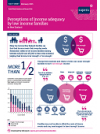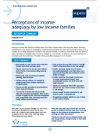Many New Zealand families are on a low income; some of these families manage to meet their everyday needs while others do not. For example, less than a half of those in the bottom income decile, and a third in the second lowest decile, report that their income is inadequate to meet their everyday needs.
The purpose of this research was to better understand why some low income families report their income to be adequate while others on similar incomes report their income to be inadequate.
Purpose
The purpose of this research was to better understand why some low income families report their income to be adequate while others on similar incomes report their income to be inadequate.
It is the first time, to our knowledge, that such comparative research looking at factors broader than just income has been undertaken in New Zealand. This research together with previous research (such as Te Pūmautanga o te Whānau, and Whānau Taketake Māori) can inform government decisions that are intended to enhance the economic resilience and wellbeing of families.
The research questions were:
1. Why do some low income families perceive their income to be adequate while others on similar incomes perceive their income to be inadequate?
2. What personal, financial, household, family and wider community factors are associated with judgements of income adequacy?
3. What might be a conceptual framework (or build on an existing framework) for understanding household economic resilience?
Methodology
The research used a two-stage approach. Firstly a literature scan was conducted, which drew on both published and unpublished research from New Zealand and overseas. The literature scan summarised existing evidence, and from that an initial framework/ hypothesis about factors which may influence income adequacy was developed. In turn this informed the qualitative design – particularly the questions used in the interviews and focus groups, and the subsequent coding framework.
Secondly, qualitative research was undertaken to explore the differences in families where income was perceived to be adequate and families where it was seen to be inadequate (research question 1). The literature review and study findings were used to identify characteristics of economically resilient low income families (research question 2) and to develop a conceptual model (research question 3).
Key Results
A key finding was that income was not the only predictor of whether a family reported their income was enough to meet their everyday needs. Several other factors were associated with reported income adequacy, including:
- Paid employment (positive association. That is, more often mentioned in the group who said their income was adequate)
- Being solely reliant on a benefit (negative association)
- Having well developed financial planning skills and strategies (positive association)
- Setting aside money for future bills (positive association)
- Ownership of assets (positive association)
- Sense of being better off than others (positive association)
- Self-efficacy – belief in one’s own ability to manage (positive association)
- Obligation to give (negative association for Pacific families)
- Getting or losing a job, and changes in relationship status (either positive or negative association)
- Time – moving in/out of having enough over the course of a year or more (either positive or negative association).
It is important to note that these associations do not necessarily imply causal relationships. It should also be noted that there was income variation within the low income families who participated in the study, and the associations mentioned here are likely to reflect income as well as non-income factors.
Factors that were common across both the ‘not enough’ and ‘enough’ groups that were related to household perceptions of income adequacy were:
- the importance of social support
- avoiding debt, but also having access to fair debt
- unexpected expenses challenging the ability to manage finances
- the use of economising behaviours as a way of coping
- common everyday core needs and expenses
- situation-specific needs and expenses, not common across all families
- the stress of managing on a low income
- core interconnected values:
- wanting the best for their children
- putting family before income
- the belief that there are more important things in life than money.
Families across both groups talked about moving in and out (over time) of having enough income to meet their everyday needs. Relationship breakdown and loss of a job were factors that negatively affected whether a family reported having enough income.
Families reported that meeting everyday needs did not necessarily equate to having a reasonable life. A reasonable life was generally defined by families as meeting everyday needs plus having:
- a content and happy family
- social contact
- low stress
- good health
- a warm, healthy home
- enough money so children don’t miss out on things such as school trips, birthday parties, sports.
This research analysed the factors broader than income that impact on reported income adequacy in New Zealand. Given the exploratory nature of the work, the implications for policy are tentative. However this research, together with previous research, provides useful information to inform Government decisions intended to enhance the economic resilience and wellbeing of families.



